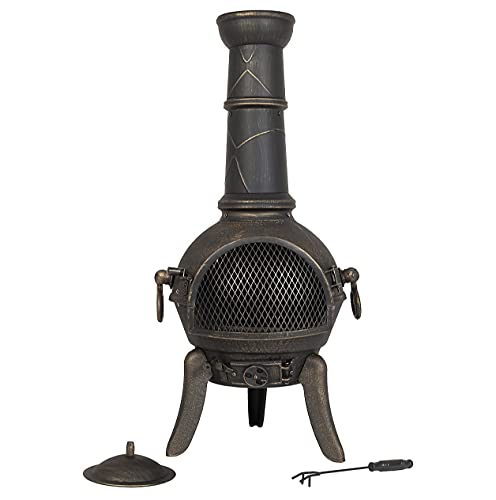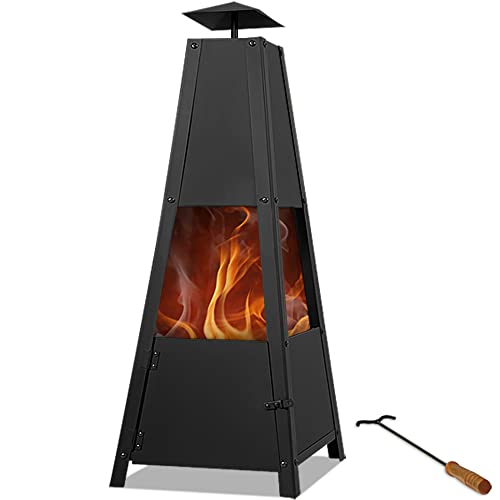9 . What Your Parents Taught You About Chiminea Terracotta
페이지 정보
작성자 Selena Fallon 작성일 24-12-14 19:42 조회 2 댓글 0본문
 A Chiminea Terracotta Adds Warmth and Ambiance to Your Backyard Patio
A Chiminea Terracotta Adds Warmth and Ambiance to Your Backyard PatioA chiminea can bring warmth and ambiance to your backyard. Its chimney directs smoke upwards to keep sparks and flames from damaging surrounding plants and igniting your house or deck.
Chimineas made of clay should be broken in slowly. The initial flames should be slow and small. Sealing a chiminea is also advised, particularly in wet climates.
Material
A chiminea is a great way to add warmth and character to your backyard patio. The classic pot-belly style is ideal for entertaining, but innovative designs now suit a wide range of decor styles. Although clay is the most well-known material, chimineas can be made from aluminum or cast iron. Each type of material has its own benefits. While clay is simple to maintain but metal is more durable and in its ability to withstand temperatures of high.
When selecting a chiminea, consider its size, design and the type of fuel. The size of the chiminea should be able to accommodate the amount of wood you be using to ensure an even flame. Larger chimneys are suited to family gatherings while smaller ones are better for intimate settings. A chimney focuses smoke upwards to shield the area from rain and stopping it from blowing around in strong winds.
The design of a chiminea is what makes it different from other outdoor fire pits. The bowl-shaped base houses the flames and protects them from wind, rain and debris. The chimney is attractive and allows you to control the size of flames.
Chimineas made of clay can be formed by hand before being fired at high temperature. They are often coated with ceramic glaze in order to make them more appealing and durable against weather damage. Some are decorated in Mexican-inspired designs. These chimineas can be found in home improvement centers.
Before lighting the chiminea, cover the interior of its base with sand that is coarse-grained or gravel. Sand reduces smoke and also prevents the clay from cracking when fired. Once you've covered your base, add a few pieces of sand in the middle. Use a natural lighter such as this one from Amazon to facilitate lighting.
When you are ready to cook, use a long-handled fork or spatula to turn the hot embers. You should not cook food directly on flames that are active as it could cause burning and cause the food to blacken beyond recognition. Start with a small fire and then build it up slowly. Then, move the cooking pan to the top of the stack of smoke.
Design
A chiminea is a fire pit that looks a bit like a large chiminea-bottomed stove with a mouth to hold the fire and an extended narrow chimney to smoke. The chimney also protects the fire from the rain and wind, which can extinguish a more open fire pit. Since over 400 years Chimineas have been used to cook for cooking and gatherings as well as for heating homes. Originally handmade of clay, they're now offered in cast iron or terracotta with both traditional and modern styles.
Modern chimineas tend to avoid the curvatures of older models, they still retain a distinctive chimney design. They are available in a variety of shapes and sizes, from 12 to 16 inches at the base and between 25 and 30 inches tall (including stand). The chimney typically rises around 6 feet.
The height of a chiminea's eave is important because it assists in directing smoke upwards, which will keep it from blowing on objects and people in your home or yard. It also allows you to use wood that has aromas that smell great as they burn, adding to the pleasure of sitting by a fire.
When selecting a chiminea you want to purchase, make sure it is constructed of sturdy materials that can withstand high temperatures. Do not purchase a chiminea with decorative elements or other features that could break or crack under the heat. If you decide to use a clay or terracotta chiminea that is not seasoned, it should be by burning small amounts of wood for three to four fires until the clay has a chance to become cured. When not in use the chiminea must be covered with a lid to prevent water from leaking onto the flames. This can cause burn.
Cast iron chimineas are more heavy and more sturdy than clay models, which means they can handle higher temperatures and rougher handling. They also offer more versatility in that they can burn coal or briquettes in addition to wood. However, if you're going for a classic style, go with clay chimineas.
Whatever material you choose, make sure to place your chiminea in a safe area away from your home and furniture or plants. The chiminea should be placed at least 10 feet away from any other structure like fencing or sheds. Create a hearth for your patio by using pavers to make a platform to place your chiminea on and make it easier to control the flame.
Installation
A chiminea adds an entirely new dimension to any outdoor space and is the central point for family gatherings. It is crucial to be aware of the requirements for maintaining a chiminea outdoor prior to buying one. Cast iron chimineas are stronger than traditional clay chimineas. However, they require slightly different care due to the distinct design.
The first step is to prepare the base of the chiminea. The bottom of the chiminea needs to be covered with sand or gravel to prevent it from coming into direct contact with the fire. This will reduce smoke and keep the chiminea from breaking.
It is important to ensure that the chiminea is installed in a secure and stable location. Never put it on a deck or any other flammable surface. If it is necessary to place it on a surface that is flammable, use a metal grate to elevate the wood and shield the chiminea from the heat of the fire and sparks.
Before you light the chiminea for the first time, it must be seasoned by igniting several small fires in it. This will prevent the chiminea from cracking when you burn lots of wood.
After each fire, thoroughly clean the chiminea by brushing with a wire-bristle brush or a cloth. Also, you should take out any creosote and ash within the chiminea. These chemicals will impact the quality and amount of fires you could have in your chiminea when they are not removed.
When not in use, the chiminea needs to be covered with a protective cover. This will stop the clay from becoming too wet and squeezing or cracking. Chimineas can suffer this type of damage if exposed for a long period of time to snow and rain.
Even in the summer, it is recommended to cover the chiminea. It is also an excellent idea to have a backup source of fuel for the fire, such as a propane tank or wood. It is also a good idea keep a nearby fire extinguisher to put out any sudden blazes.
Maintenance
Despite the different materials that chimineas are fabricated from They all require regular maintenance to ensure they last as long as they can. This includes cleaning the structure and applying protective coatings and storing it properly in the off-season to protect against extreme weather conditions. Taking these measures and following basic usage guidelines will extend the lifespan of your chiminea and reduce the potential dangers to your safety.
Chimineas are made of clay and as such can crack when exposed to abrupt temperature changes. This is the reason it's essential to keep your terra cotta in a dry and safe location during the off-season, preferring a cover that will guard against rain and frost. You should also regularly apply the sealant to your clay fireplace to shield it from moisture and temperature changes.
When cleaning a chiminea, it is important to use non-abrasive products and a soft brush or cloth to avoid damaging the clay surface. A bucket of water or a hose is recommended to wash off the surface after scrubbing, and it's crucial to let the chiminea dry completely before using it again. This will help prevent mold and mildew growth and keep it looking brand new.
If you have a cracked area on your chiminea, it is crucial to clamp the pieces together. Then, you can apply outdoor oven cement over the crack. You can purchase this from most hardware stores and it must be applied using an pointing trowel or spatula. It is essential to allow the cement to fully dry before lighting a test fire in the chiminea.
 After the cement has dried, put medium-coarse sandpaper over the damaged area to prepare it for painting. Then, you can paint it with a paint that is masonry or household in a color that matches your chiminea. If there is any rust or corrosion you can eliminate it by sanding, and then cleaning the affected areas with water.
After the cement has dried, put medium-coarse sandpaper over the damaged area to prepare it for painting. Then, you can paint it with a paint that is masonry or household in a color that matches your chiminea. If there is any rust or corrosion you can eliminate it by sanding, and then cleaning the affected areas with water.댓글목록 0
등록된 댓글이 없습니다.
